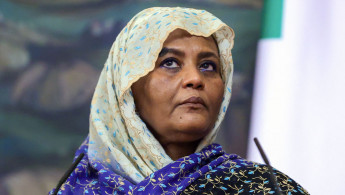Sudan, Israel will not discuss Khartoum embassy: Sudan FM
Sudan and Israel will not discuss the opening of an Israeli embassy in Khartoum, the Sudanese foreign minister has said.
Mariam Sadiq Al-Mahdi told UAE daily The National that an exchange of ambassadors with Israel is not on the cards despite normalisation efforts.
It comes almost a year after Sudan began the process of establishing diplomatic ties with Israel, after a decades-long boycott by Arab states.
"There is no talk at any official level, and I'm telling you this as the foreign minister, about opening an Israeli embassy in Khartoum," said Al-Mahdi.
Last year saw the UAE, Bahrain, and Morocco also establish ties with Israel.
The FM also strongly rejected suggestions that Israeli representatives had made trips to Sudan to talk about collaborating across varying sectors.
"There's not any sign of normalisation with Israel," Al-Mahdi asserted.
"Abolishing a law on boycotting Israel does not mean that we consider opening an Israeli embassy in Khartoum."
This April, Khartoum got rid of a law - in force since 1958 - that banned political and financial relations with Israel.
She highlighted that Khartoum's as-yet non-existent final parliament - to be created as part of the nation's path to democracy - will have to consider ties with Israel before an embassy is opened.
However, while this transfer to democracy is ongoing, Al-Mahdi explained that her country's interim authority must agree to all moves concerning its association with Israel.
Khartoum's foreign minister claimed bolstering US and Western links required deepening its connection with Israel.
"This file has been completely linked to lifting Sudan off the US state sponsors of terrorism list."
Sudan has made efforts to become part of the World Trade Organisation, which requires countries belonging to it not to boycott other members, the foreign minister explained.
"We want to be a country open to the world and different partnerships," Al-Mahdi added.
Anti-normalisation protesters in Khartoum took to the streets on Saturday to stand against the country's recent normalisation deal with Israel https://t.co/gxwa9EUsO3 #Sudan
— The New Arab (@The_NewArab) January 19, 2021
Khartoum had technically been at war with Israel since 1948 until the normalisation deal was reached in October 2020.
The year 1948 marked the beginning of the Nakba or "Catastrophe", which saw hundreds of thousands of Palestinians ethnically cleansed from their homes with the creation of the Israeli state, amid fighting with several Arab nations.
Many academics and activists say the Nakba is ongoing in Israel's policies to this day.
Al-Madhi said the interim authority - which contains members drawn from both the country's armed forces and civilians - is divided on whether to hand former dictator Omar Al-Bashir to the International Criminal Court (ICC).
No agreement on "how to implement the process of handing Al-Bashir to the ICC" exists, the FM explained.
The global court seeks to try Al-Bashir for violations including crimes against humanity and genocide given the violence in the Darfur region that took over 300,000 lives and forced two and a half million to flee from their areas.
An unsuccessful coup in Sudan was attributed to supporters of the ex-dictator last Tuesday.





 Follow the Middle East's top stories in English at The New Arab on Google News
Follow the Middle East's top stories in English at The New Arab on Google News


